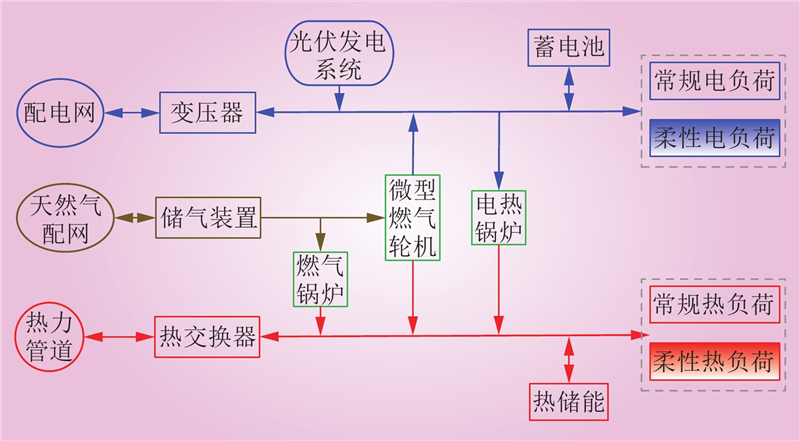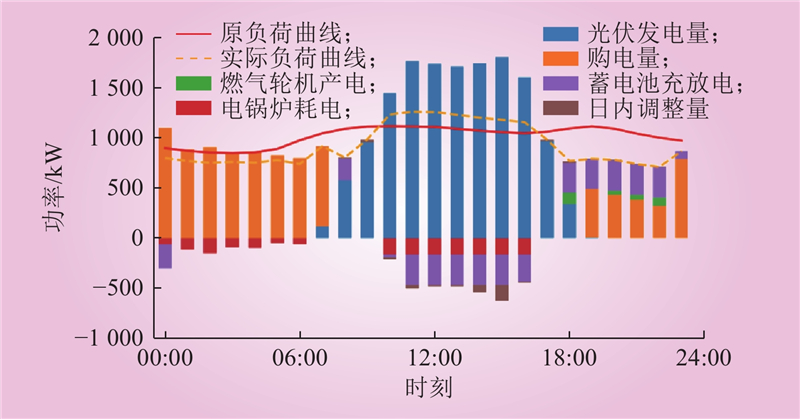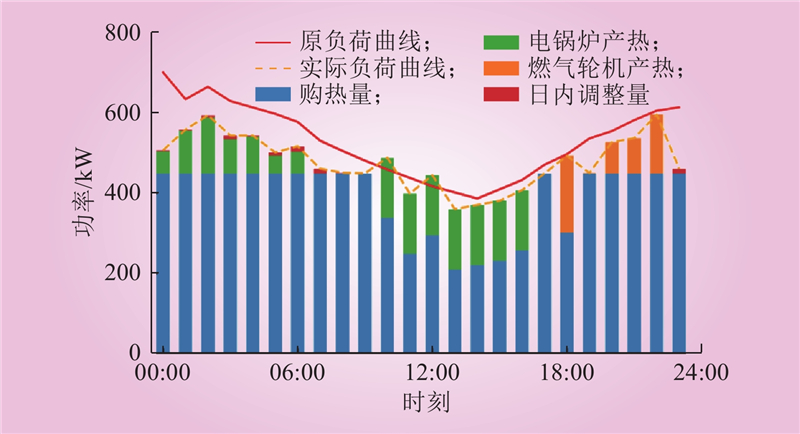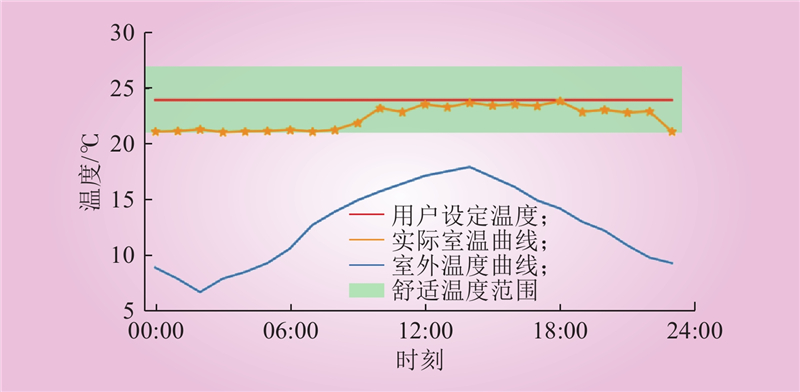| 1 |
凡鹏飞, 李宝琴, 侯江伟, 等. 配电网分布式电源经济可承载力评估[J]. 中国电力, 2024, 57 (7): 196- 202.
DOI
|
|
FAN Pengfei, LI Baoqin, HOU Jiangwei, et al. Economic capacity assessment of renewables in distribution networks[J]. Electric Power, 2024, 57 (7): 196- 202.
DOI
|
| 2 |
钱乙卫, 田浩, 刘财华, 等. 考虑概率分布的分布式光伏无功下垂控制策略[J]. 发电技术, 2024, 45 (2): 273- 281.
DOI
|
|
QIAN Yiwei, TIAN Hao, LIU Caihua, et al. Droop control strategy of distributed photovoltaic reactive power considering probability distribution[J]. Power Generation Technology, 2024, 45 (2): 273- 281.
DOI
|
| 3 |
王杰, 郑飞, 张鹏城, 等. 基于数据驱动的高比例新能源配电网规划模型[J]. 中国电力, 2025, 58 (3): 175- 182.
DOI
|
|
WANG Jie, ZHENG Fei, ZHANG Pengcheng, et al. Model of high-proportion new energy distribution network planning based on data-driven approach[J]. Electric Power, 2025, 58 (3): 175- 182.
DOI
|
| 4 |
胡嘉诚, 张宁, 曹雨桐, 等. 分布式能源接入下虚拟电厂负荷优化调度决策[J]. 综合智慧能源, 2025, 47 (1): 62- 69.
DOI
|
|
HU Jiacheng, ZHANG Ning, CAO Yutong, et al. Load optimization scheduling decision for virtual power plants with distributed energy accessed[J]. Integrated Intelligent Energy, 2025, 47 (1): 62- 69.
DOI
|
| 5 |
李玲, 曹锦业, Nikita Tomin, 等. 计及电动汽车接入的区域综合能源系统双层日前协调优化调度[J]. 电力建设, 2023, 44 (5): 23- 33.
DOI
|
|
LI Ling, CAO Jinye, TOMIN N, et al. Bi-level coordinated day-ahead optimal dispatch of regional integrated energy system considering the integrations of electric vehicles[J]. Electric Power Construction, 2023, 44 (5): 23- 33.
DOI
|
| 6 |
LI Y, WANG C L, LI G Q, et al. Improving operational flexibility of integrated energy system with uncertain renewable generations considering thermal inertia of buildings[J]. Energy Conversion and Management, 2020, 207, 112526.
DOI
|
| 7 |
LI Y, HAN M, SHAHIDEHPOUR M, et al. Data-driven distributionally robust scheduling of community integrated energy systems with uncertain renewable generations considering integrated demand response[J]. Applied Energy, 2023, 335, 120749.
DOI
|
| 8 |
WANG M Y, WANG R Q, LIU J Y, et al. Operation optimization for park with integrated energy system based on integrated demand response[J]. Energy Reports, 2022, 8, 249- 259.
|
| 9 |
PAN C C, JIN T, LI N, et al. Multi-objective and two-stage optimization study of integrated energy systems considering P2G and integrated demand responses[J]. Energy, 2023, 270, 126846.
DOI
|
| 10 |
WANG Y L, MA Y Z, SONG F H, et al. Economic and efficient multi-objective operation optimization of integrated energy system considering electro-thermal demand response[J]. Energy, 2020, 205, 118022.
DOI
|
| 11 |
权超, 冯怿彬, 赵鲁臻, 等. 计及通信资源优化的温控负荷调控策略[J]. 浙江电力, 2024, 43 (8): 74- 84.
|
|
QUAN Chao, FENG Yibin, ZHAO Luzhen, et al. A scheduling strategy for thermostatically-controlled loads considering communication resource optimization[J]. Zhejiang Electric Power, 2024, 43 (8): 74- 84.
|
| 12 |
马嘉晨, 袁满, 杨德友, 等. 用于提升风电消纳能力的高载能负荷调度策略研究[J]. 东北电力大学学报, 2024, 44 (2): 79- 87.
|
|
MAN Jiachen, YUAN Man, YANG Deyou, et al. Research on high-energy load dispatching strategy usedto improve wind power ability[J]. Journal of Northeast Electric Power University, 2024, 44 (2): 79- 87.
|
| 13 |
朱凯文. 负荷侧资源调节潜力及其不确定性研究[D]. 南京: 南京理工大学, 2023.
|
|
ZHU Kaiwen. Research on adjustable potential and uncertainties of load side resources[D]. Nanjing: Nanjing University of Science and Technology, 2023.
|
| 14 |
陈敏, 高赐威, 陈宋宋, 等. 考虑数据中心用电负荷调节潜力的双层经济调度模型[J]. 中国电机工程学报, 2019, 39 (5): 1301- 1314.
|
|
CHEN Min, GAO Ciwei, CHEN Songsong, et al. Bi-level economic dispatch modeling considering the load regulation potential of Internet data centers[J]. Proceedings of the CSEE, 2019, 39 (5): 1301- 1314.
|
| 15 |
祁兵, 曹望璋, 李彬, 等. 考虑托管式数据中心负荷调节不确定性的区间优化模型[J]. 电网技术, 2022, 46 (1): 39- 49.
|
|
QI Bing, CAO Wangzhang, LI Bin, et al. Interval optimization model considering uncertainty of load regulation for colocation data center[J]. Power System Technology, 2022, 46 (1): 39- 49.
|
| 16 |
黄海泉, 黄晓巍, 姜望, 等. 新型配电网分布式储能系统方案及配置研究综述[J]. 南方能源建设, 2024, 11 (4): 42- 53.
|
|
HUANG Haiquan, HUANG Xiaowei, JIANG Wang, et al. A review of distributed energy storage system solutions and configurations for new distribution grids[J]. Southern Energy Construction, 2024, 11 (4): 42- 53.
|
| 17 |
周洋, 黄德志, 李培栋, 等. 考虑平衡端点相位不对称及光伏接入的低压配电网三相潮流模型[J]. 中国电力, 2024, 57 (10): 190- 198.
DOI
|
|
ZHOU Yang, HUANG Dezhi, LI Peidong, et al. A three-phase power flow model for low-voltage distribution networks considering balanced bus phase asymmetry and photovoltaic access[J]. Electric Power, 2024, 57 (10): 190- 198.
DOI
|
| 18 |
魏伟, 余鹤, 叶利, 等. 基于FCM-SENet-TCN的低压台区光伏超短期功率预测方法[J]. 中国电力, 2025, 58 (6): 172- 179.
|
|
WEI Wei, YU He, YE Li, et al. Low voltage substation photovoltaic ultra short term power prediction method based on FCM-SENet-TCN[J]. Electric Power, 2025, 58 (6): 172- 179.
|
| 19 |
林沛昕. 面向园区最优用能的分布式光伏及储能容量配置方法[J]. 东北电力大学学报, 2024, 44 (5): 50- 56.
|
|
LIN Peixin. Distributed photovoltaic and energy storage capacity allocation method for the optimal use of energy in the park[J]. Journal of Northeast Electric Power University, 2024, 44 (5): 50- 56.
|
| 20 |
张江丰, 葛一统, 谭珺敉, 等. 风电场联合分布式储能的协同调频策略[J]. 浙江电力, 2024, 43 (9): 67- 77.
|
|
ZHANG Jiangfeng, GE Yitong, TAN Junmi, et al. A coordinated frequency regulation strategy integrating wind farms with distributed energy storage[J]. Zhejiang Electric Power, 2024, 43 (9): 67- 77.
|
| 21 |
CHEN B R, LIU T Q, LIU X, et al. Distributionally robust coordinated expansion planning for generation, transmission, and demand side resources considering the benefits of concentrating solar power plants[J]. IEEE Transactions on Power Systems, 2023, 38 (2): 1205- 1218.
DOI
|
| 22 |
高月芬, 员成博, 孔凡鹏, 等. 需求响应激励下耦合电转气、碳捕集设备的综合能源系统优化[J]. 中国电力, 2024, 57 (4): 32- 41.
DOI
|
|
GAO Yuefen, YUN Chengbo, KONG Fanpeng, et al. Optimization of integrated energy system coupled with power-to-gas and carbon capture and storage equipment under demand response incentive[J]. Electric Power, 2024, 57 (4): 32- 41.
DOI
|
| 23 |
LI P, WANG Z X, WANG J H, et al. Two-stage optimal operation of integrated energy system considering multiple uncertainties and integrated demand response[J]. Energy, 2021, 225, 120256.
DOI
|
| 24 |
高明非, 韩中合, 赵斌, 等. 区域综合能源系统多类型储能协同优化与运行策略[J]. 中国电力, 2024, 57 (9): 205- 216.
DOI
|
|
GAO Mingfei, HAN Zhonghe, ZHAO Bin, et al. Coordinated optimization and operational strategy for multi-type energy storage in regional integrated energy systems[J]. Electric Power, 2024, 57 (9): 205- 216.
DOI
|
| 25 |
李江南, 程韧俐, 周保荣, 等. 含碳捕集及电转氢设备的低碳园区综合能源系统随机优化调度[J]. 中国电力, 2024, 57 (5): 149- 156.
DOI
|
|
LI Jiangnan, CHENG Renli, ZHOU Baorong, et al. Stochastic optimal of integrated energy system in low-carbon parks considering carbon capture storage and power to hydrogen[J]. Electric Power, 2024, 57 (5): 149- 156.
DOI
|
| 26 |
LI Y Z, LI Y, ZENG Z G. Optimal scheduling of integrated demand response-enabled community integrated energy systems in uncertain environments[M]//Flexible Load Control for Enhancing Renewable Power System Operation. Singapore: Springer Nature Singapore, 2024: 215–238.
|
| 27 |
张晓辉, 刘小琰, 钟嘉庆. 考虑奖惩阶梯型碳交易和电–热转移负荷不确定性的综合能源系统规划[J]. 中国电机工程学报, 2020, 40 (19): 6132- 6142.
|
|
ZHANG Xiaohui, LIU Xiaoyan, ZHONG Jiaqing. Integrated energy system planning considering a reward and punishment ladder-type carbon trading and electric-thermal transfer load uncertainty[J]. Proceedings of the CSEE, 2020, 40 (19): 6132- 6142.
|
| 28 |
黄南天, 郭玉, 赵暄远. 计及辐照区间划分的含光伏电源配电网源-荷联合场景生成[J]. 东北电力大学学报, 2023, 43 (5): 78- 84.
|
|
HUANG Nantian, GUO Yu, ZHAO Xuanyuan. Combined source-load scenario generation for PV-containing distribution networks with calculation andirradiation interval classification[J]. Journal of Northeast Electric Power University, 2023, 43 (5): 78- 84.
|









